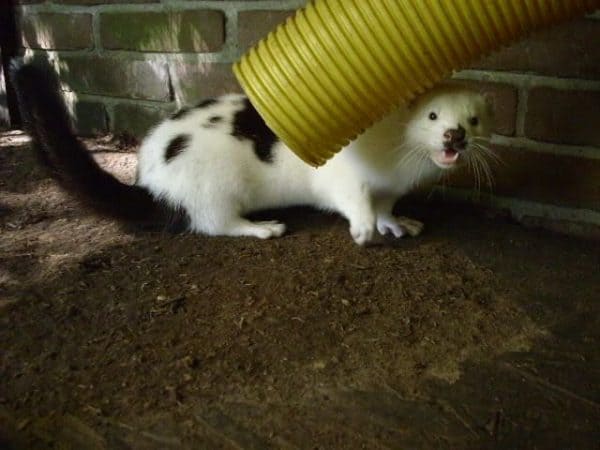Ferrets are often considered a mix between a dog and a cat, and for many reasons they definitely are. This is because their playful and loving personality reminds people of puppies, and their long sleeping schedule and cleaning habits remind everyone of cats. And the best thing about them is that they can definitely be litter trained.

This can save you a lot of trouble as ferrets have a very fast metabolism, which means they do their business pretty often. Ferrets are known to sleep a lot, play a lot, and definitely poop a lot. In this article, we’ll talk about a ferret’s potty habits so you can train yours better.
Can ferrets be potty trained?
Ferrets are incredibly smart, which is why they are known to be very mischievous as well. You can train them to do all kinds of tricks quite fast, especially if there are favorite treats involved. And luckily, this also includes potty training. However, it’s a very different business than training a cat to use a litter box.
Despite being so smart, ferrets forget very fast. This means that you shouldn’t even try placing a litter box in a specific place in the house and expect the ferret to go there every time. If there isn’t a litter box in sight, the closest corner is the first place the ferret will use.
You will need a lot of patience, treats, and supervision if you want the training to be a success. And even then, you should keep in mind that it only works about 98% of the time, so accidents can still happen from time to time.
Why won’t my ferret use the litter box?
The short answer is very simple: It’s because it’s a ferret. They just love being independent and sometimes to things just for the heck of it. This includes nipping even if they know they shouldn’t nip, do their business where they shouldn’t, etc. It’s just something you will have to deal with if it happens occasionally.
But if the ferret refuses to use a litter box 100% of the time, you need to change the place of the litter box. The best thing to do is place the litter box where it typically likes going to. And if it’s an inconvenient place, disinfect the area very well and place their toys or a sleeping bed there. Ferrets won’t do their business where they sleep or where they play. Food is another option.
Litter training should always start from the cage and then expand to the whole room. The same technique needs to be used regardless if the ferret is loose or in a cage. Set a specific corner for the litter box and place things the ferret likes in the corners you want to keep clean.
How to tell if a ferret wants to poop?

Catching your ferret exactly when it wants to poop can be extremely hard. This is why your best bet is to wake the ferret up when you know it usually wakes up and keep an eye on it. Ferrets typically poop in the first 15 minutes so you won’t have to wait long. Place the ferret in the litter box and keep it there until it finishes. You should repeat this every single day for about a month or two for it to be effective.
If you supervise the ferrets while they play, you can tell when one of them needs to use the litter box quite easily. They will stop suddenly in the middle of playing and bolt directly to the nearest corner. It’s actually very amusing. Catch it before it does anything and place it into the right litter box.
Why do ferrets poop in corners?
Any animal feels the most vulnerable when it poops. This is because it has lots of blind spots and a predator can come at any moment. This is also why puppies will make eye contact with you while pooping outside so they know you have their back if something happens. And ferrets are exactly the same.
Pooping in an open area makes them feel very vulnerable and a corner makes them feel safer. This is because there are two walls meeting in the back and they know nothing can come from there. And while they’re doing their business, they can keep an eye on the rest of the open space and not worry about what might come up behind them.
This is why you should always place the litter box in a corner. You will also quickly notice how many ferret litter boxes are designed specifically for corners.
Is ferret poop toxic?
Animal poop in general can be very toxic, and the poop from a ferret is no different, especially if they’re on a raw diet. Ferrets can shed lots of germs, including Salmonella. This is why you should avoid direct contact with your ferret’s poop and urine. You can get very sick, especially if you don’t wash your hands properly. Always use a scoop to deal with the poop and clean everything with gloves on.
When washing your hands, make sure you’re using a soap that is good at disinfecting as well. If you only have a regular soap, spend around 2 minutes scrubbing your hands if you went into contact with ferret poop. Make sure the kids are washing their hands after playing with the ferret as well.
How to potty train a ferret. Litter box training.
Always start from the cage. You can either pick a specific corner that is easier to clean each day or let the ferret pick its own corner and then place the litter box in there. Make sure it’s away from food, toys, and the sleeping bed. If the cage is too small, use a hammock instead of a bed.
Place toys and blankets the ferret can burrow in and play with, in all the other corners. This will give the ferret no other choice than go where you want it to go. You will need lots of patience and time to supervise the ferret for a month or two. Don’t miss an opportunity to correct the ferret as well. It can easily get used to bad habits.
Choosing a litter box for a ferret
Ferrets need a litter box that they can easily enter and get out of. This is why boxes with one easy way in and surrounded by tall ways are the best choice. Place a mat underneath the litter box so the ferret won’t drag the litter all over the house. They don’t tend to bury their poop but they still get out of the box with lots of litter on their paws.
The reason why the other walls are important to be tall is that ferrets somehow manage to get poop on the wall behind the litter box. A box with a tall wall behind it is the best way to prevent any of that from happening. It also makes the ferret feel safer while doing its business.
You should also keep in mind that ferrets need a lot of space so make sure the litter box is quite large.
FAQ – Frequently Asked Questions
Why is my ferret’s poop green?
If your ferret has green poop, especially if it’s a dark green, it might have a very serious illness. There are lots of illnesses that cause green and water poop, so make sure you’re running to the vet as soon as possible. If the clinic is closed and there’s no other one around, you should get a vet on the phone as quickly as possible. One of the most common causes of green poop is the overgrowth of Clostridial bacteria, which is a very common issue in ferrets. More than that, diarrhea has a very foul odor as well.
Why is my ferret’s poop watery?
Ferret diarrhea can happen because of different causes. It can be something as simple as a change in the diet, to a very bad reaction to the new medicine. The stool of a ferret should never be watery so pay extra attention to the ferret that seems to have diarrhea. If it persists more than a day or two you should get it to the vet as quickly as possible. Bacterial infections are quite common among ferrets. This includes mustelae, helicobacter, campylobacter sp., Clostridium sp. etc. Go to the vet with your sick ferret and get a sample of poop so the vet can have a look at it and have a clear idea about what is going on.
Why is there blood in my ferret’s poop?
Bloody stool is never a good sign. It means that the animal has some damage done to its digestive system. What’s the exact cause can depend on the color of the poop, and a vet can tell where the digestive system is damaged just by looking at the bloody stool. Go to the vet as soon as possible and you might have to let the pet spend the night at the clinic if it’s a very serious situation. Bringing their favorite toy and hammock will make the ferret feel a bit safer.
